Antidepressant Sexual Side Effect Comparison Tool
Antidepressant Comparison
| Medication | Side Effect Rate | Key Notes |
|---|---|---|
| Paroxetine (Paxil) | Up to 80% | Worst offender. Commonly causes delayed orgasm and loss of desire. |
| Sertraline (Zoloft) & Citalopram (Celexa) | 60-70% | Very common issues. High risk of sexual dysfunction. |
| Fluoxetine (Prozac) | High risk | Slightly better than others, but still significant risk—especially long-term. |
| Venlafaxine (Effexor XR) | High risk | SNRI with similar sexual side effects as SSRIs. |
| Bupropion (Wellbutrin) | 2-3 times fewer | Recommended Clear winner. Causes far fewer side effects. Many report improved desire and arousal. |
| Mirtazapine (Remeron) | Low rates | Good for sleep and appetite issues. Minimal sexual impact. |
| Agomelatine (Valdoxan) | Minimal impact | Works on melatonin receptors without suppressing dopamine. |
If you're taking an antidepressant and noticing your sex drive has vanished, or you're struggling to get or stay aroused, you're not alone. About 35-70% of people on antidepressants experience some form of sexual side effect - and for many, it's worse than the depression itself. It’s not weakness. It’s chemistry. And it’s fixable.
Why Antidepressants Kill Your Sex Drive
Most antidepressants, especially SSRIs like sertraline (Zoloft), fluoxetine (Prozac), and paroxetine (Paxil), work by boosting serotonin in your brain. That helps lift your mood. But serotonin doesn’t just affect depression - it also shuts down the pathways that control desire, arousal, and orgasm. Think of it like turning down a volume knob. Dopamine and norepinephrine, the chemicals that make sex feel good, get silenced. For men, that means less interest, trouble getting or keeping an erection, or delayed or absent ejaculation. For women, it’s dryness, no orgasm, or just not caring about sex anymore. Studies show 61% of women on SSRIs report low desire, and 58% of men report erectile issues. Here’s the catch: depression itself can cause sexual problems. About 35-50% of people with untreated depression already have low libido. So it’s not always the medication - it’s the combination. That’s why simply assuming your sex life is “just depression” is a mistake. You need to know which is which.Which Antidepressants Are Worst for Sex?
Not all antidepressants are created equal when it comes to sex. Some are far more likely to cause problems.- Paroxetine (Paxil): The worst offender. Up to 80% of users report sexual side effects. It’s the most likely to cause delayed orgasm and loss of desire.
- Sertraline (Zoloft) and Citalopram (Celexa): Very common. About 60-70% of users have issues.
- Fluoxetine (Prozac): Slightly better than others, but still high risk - especially long-term.
- Venlafaxine (Effexor XR): An SNRI, but just as bad as SSRIs for sex.
- Bupropion (Wellbutrin): The clear winner. In head-to-head trials, it causes 2-3 times fewer sexual side effects than SSRIs. Many patients report improved desire and arousal after switching.
- Mirtazapine (Remeron): Often used for sleep and appetite, it has low sexual side effect rates. Good for people who also struggle with insomnia.
- Agomelatine (Valdoxan): Used in Europe and Australia, it works on melatonin and serotonin receptors without suppressing dopamine. Minimal sexual impact.
What to Do If You’re Already on an Antidepressant
You don’t have to suffer in silence. There are four proven strategies that work - and they’re backed by clinical trials.- Switch to a lower-risk antidepressant: This is the most effective option. Studies show 68% of patients see improvement after switching from an SSRI to bupropion. The key is to do it right: don’t quit cold turkey. A 2-4 week cross-taper - slowly reducing the old drug while increasing the new one - prevents withdrawal symptoms and keeps depression under control.
- Add bupropion as a booster: If you want to stay on your current SSRI, adding a low dose of bupropion (150mg daily) can restore sexual function. A 2019 trial found 58% of women on SSRIs regained normal orgasm and desire after adding bupropion.
- Use ED meds like sildenafil (Viagra): For men, Viagra or tadalafil (Cialis) can help. In trials, 65-70% of men on SSRIs saw better erections with sildenafil - compared to just 25% on placebo.
- Try cyproheptadine for anorgasmia: This older antihistamine, taken at 4mg at night, has shown promise for women struggling with orgasm. One 2021 study found 52% of women regained orgasmic function - double the placebo rate.
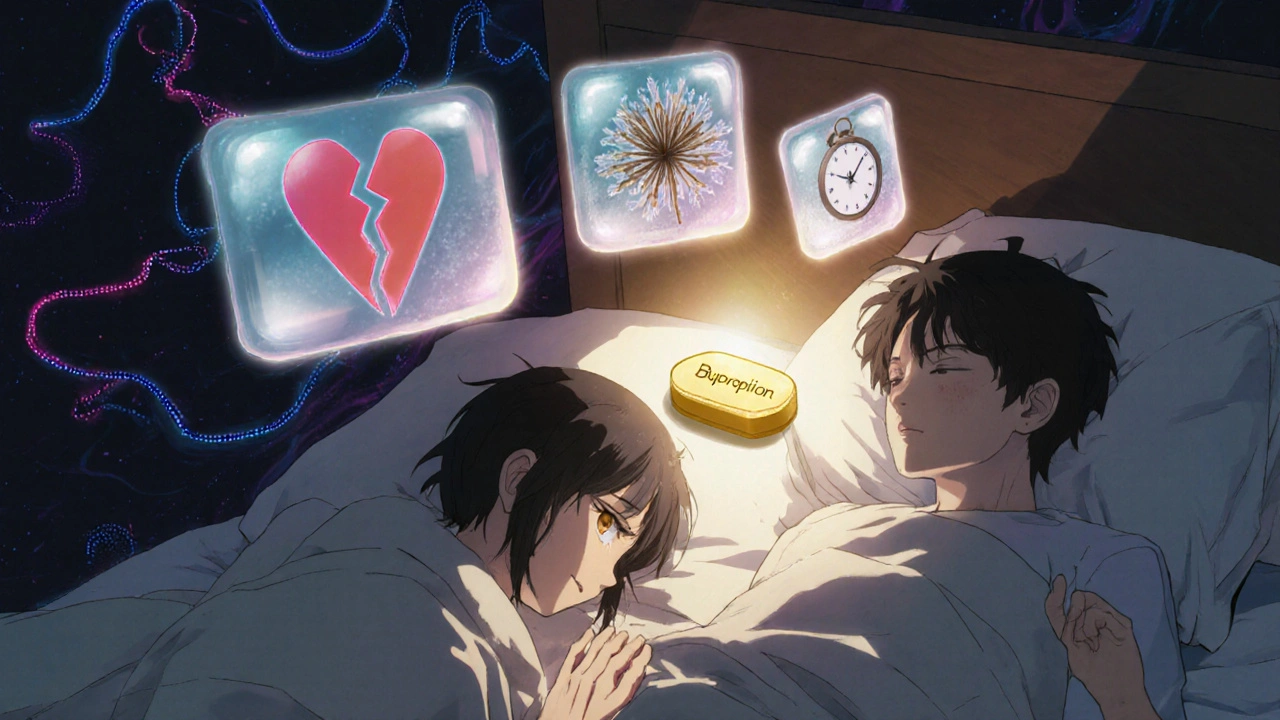
Drug Holidays: A Risky Shortcut
Some people try skipping their pill on weekends - a “drug holiday.” It sounds smart. Take your pill Monday through Friday, skip Saturday and Sunday, and hope your libido comes back. It doesn’t work well. For short-half-life drugs like paroxetine (which leaves your system in 24 hours), you might get a temporary boost. But for fluoxetine, which sticks around for days, it’s useless. Worse, you risk triggering withdrawal: headaches, dizziness, anxiety, even brain zaps. And if you’re not careful, your depression comes roaring back. Bottom line: Drug holidays are not a reliable solution. They’re a gamble. And the stakes are your mental health.The Silent Problem: PSSD
There’s a rare but terrifying condition called Post-SSRI Sexual Dysfunction (PSSD). It’s when sexual side effects don’t go away after you stop the drug. Symptoms - low desire, numb genitals, inability to orgasm - can last for months or even years. It’s rare: only 0.5-1.2% of users develop it, according to research. But it’s real. Since 2010, over 28 peer-reviewed case reports have documented it. The FDA didn’t even acknowledge it until recently. If you’ve stopped an SSRI and still feel “sexually numb,” don’t ignore it. Talk to a specialist. There are no approved treatments yet, but some patients report improvement with cognitive behavioral therapy or low-dose stimulants under supervision.What Doctors Should Be Asking You
Most doctors never ask about sex. They ask about sleep. They ask about appetite. But rarely, “How’s your libido?” The American Psychiatric Association recommends screening for sexual side effects at every visit using the AZ Sex Experience Scale (ASEX). It’s a simple 5-question tool that catches dysfunction with 89% accuracy. If your doctor doesn’t use it, ask them to. And if you’re not getting help? Push back. Bring this data. Say: “I’m on an SSRI. My sex life is gone. What are my options?”Cost and Accessibility
Switching meds doesn’t have to break the bank. Generic bupropion XL 150mg costs about $15.72 a month. Brand-name Zoloft? Around $58. That’s a 70% savings - and better sex. Esketamine (Spravato), a newer nasal spray approved in 2019, has minimal sexual side effects (only 3.2% of users report issues). But it costs $880 per dose and requires clinic visits. For most people, it’s overkill. The future is promising. A new drug called SEP-227162, currently in Phase II trials, reduced sexual side effects by 87% compared to sertraline. It’s not available yet - but it’s coming.Real People, Real Stories
On Reddit’s r/antidepressants, 78% of people who posted about sexual side effects said it damaged their relationships. 42% quit their meds without telling their doctor. That’s dangerous. Depression can come back fast. On Drugs.com, only 18% of users said their sexual side effects improved after six months - even though clinical trials say 30-40% should. Why the gap? Because real life isn’t a controlled study. People don’t get monitored. They don’t get alternatives offered. They just suffer. You don’t have to be one of them.What to Do Next
If you’re struggling with sexual side effects from antidepressants:- Don’t stop your medication on your own.
- Write down your symptoms: What’s changed? When did it start?
- Ask your doctor: “Is my current medication likely causing this? What are my alternatives?”
- Request bupropion as an option - it’s the most proven switch.
- If you’re a woman with anorgasmia, ask about cyproheptadine.
- If you’re a man with erectile issues, ask about sildenafil.
- Use the ASEX scale to track progress.
Do all antidepressants cause sexual side effects?
No. While SSRIs and SNRIs like Zoloft and Effexor commonly cause sexual problems, other antidepressants like bupropion (Wellbutrin), mirtazapine (Remeron), and agomelatine (Valdoxan) have much lower rates. Bupropion is especially known for having little to no sexual side effects - and in some cases, even improves libido.
How long do sexual side effects last after stopping antidepressants?
For most people, sexual function returns within a few weeks after stopping the medication. But in about 0.5-1.2% of cases, symptoms persist for months or longer - a condition called Post-SSRI Sexual Dysfunction (PSSD). If your symptoms don’t improve after 2-3 months off the drug, see a specialist.
Can I take Viagra with my antidepressant?
Yes, sildenafil (Viagra) is safe and effective for men taking SSRIs. Clinical trials show 65-70% of men experience improved erections with Viagra while on antidepressants. Always talk to your doctor first - especially if you have heart issues or take nitrates.
Is bupropion as effective as SSRIs for depression?
Bupropion is slightly less effective than SSRIs for severe depression, but equally effective for mild to moderate cases. It’s especially helpful if you also have low energy, fatigue, or trouble concentrating. Many patients find it just as effective - with the added benefit of better sex.
Why don’t doctors talk about this more?
Many doctors aren’t trained to ask about sexual side effects - or assume patients won’t bring it up. Studies show only 20-30% of patients ever mention it voluntarily. But guidelines from the American Psychiatric Association now recommend routine screening. If your doctor doesn’t ask, ask them. You deserve better.
Can therapy help with antidepressant-related sexual problems?
Yes. Cognitive behavioral therapy (CBT) and sex therapy can help rebuild desire and reduce performance anxiety, even while you’re on medication. It won’t fix the chemical side effect - but it can help you reconnect with your body and partner. Many people find it makes switching meds easier and improves overall satisfaction.

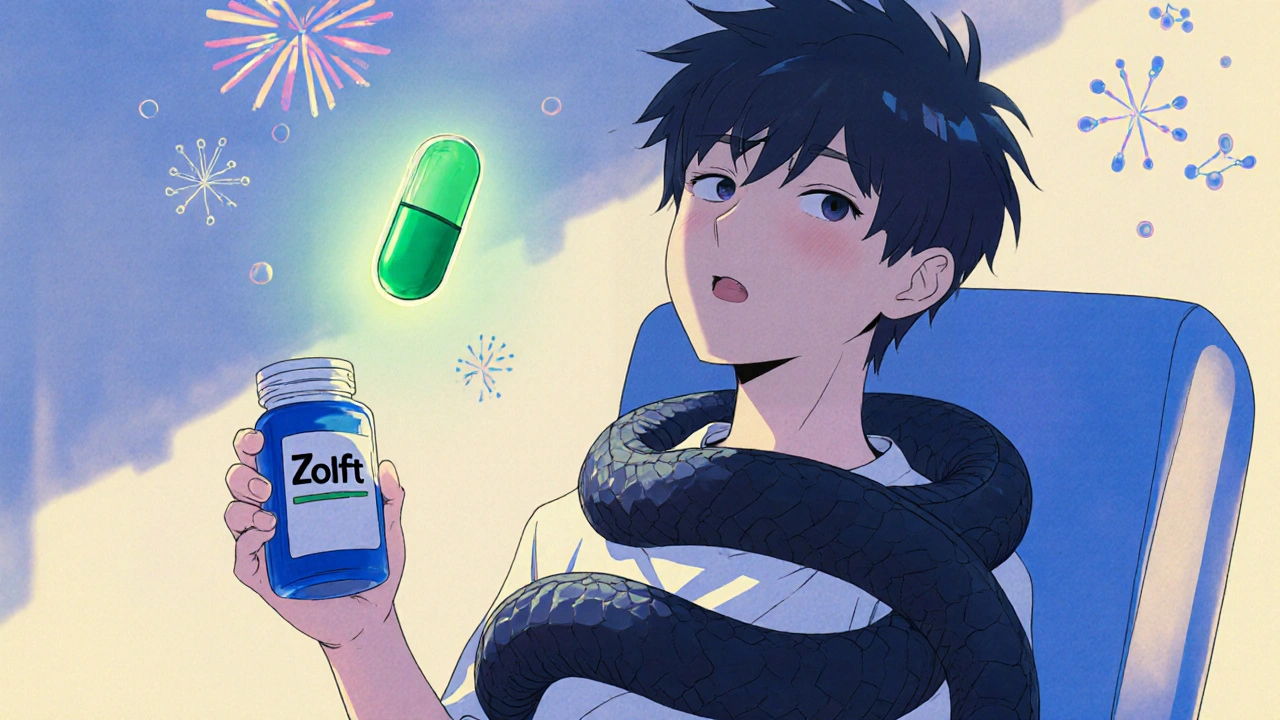
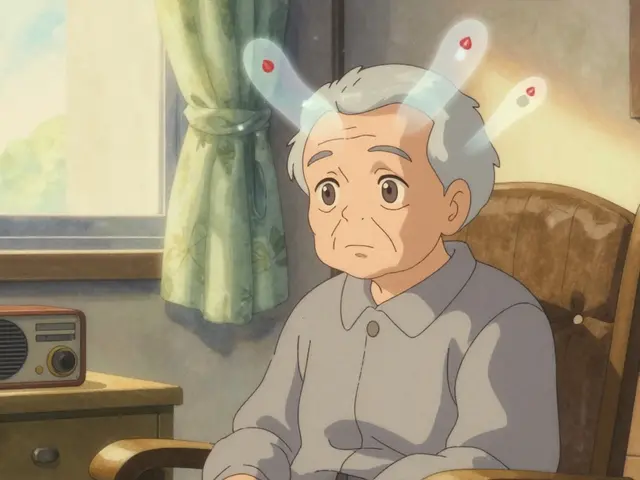
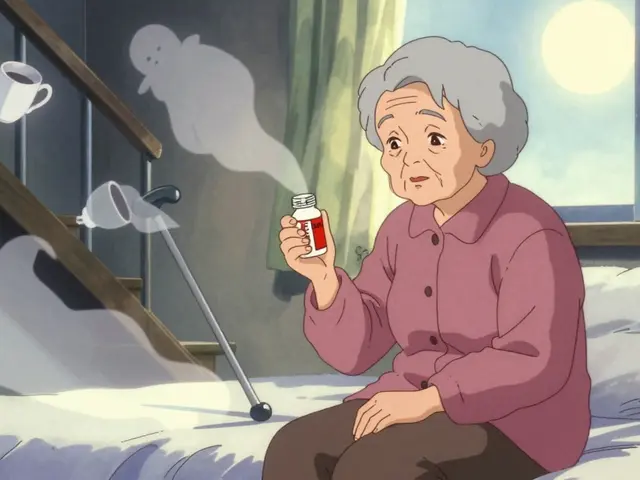
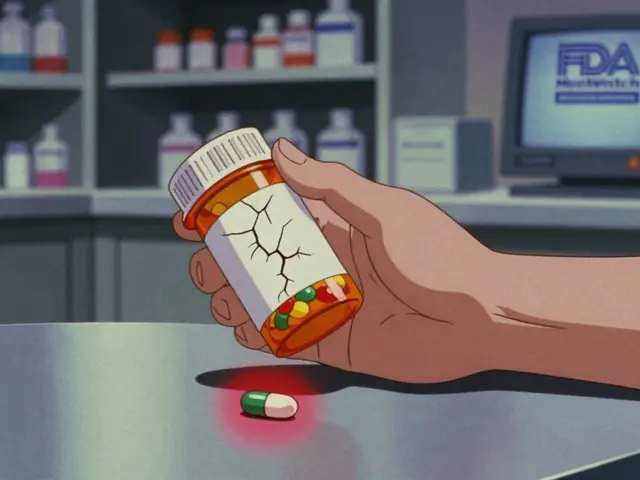

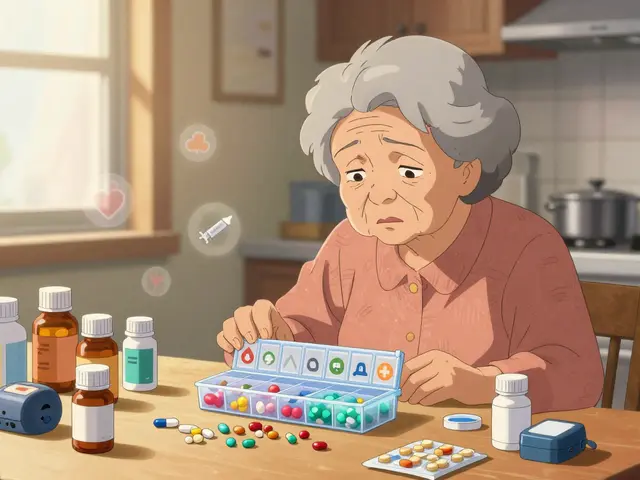
Andrew Forthmuller
November 11, 2025 AT 12:04Switched from Zoloft to Wellbutrin last year. Sex drive came back like I’d been asleep for a decade. Best decision I ever made.
Elizabeth Buján
November 12, 2025 AT 21:10im so tired of doctors acting like sex is a bonus feature and not a core part of being human. if your med turns you into a zombie who doesn’t care about kissing or touching or even thinking about it… that’s not ‘side effect’ that’s soul murder. 🙃
Nicole M
November 13, 2025 AT 18:42Anyone else notice how the FDA still acts like PSSD is some weird internet myth? I’ve been off SSRIs for 18 months and still feel like my genitals are made of foam.
manish kumar
November 14, 2025 AT 14:12As someone from India who’s been on antidepressants for over five years, I can say that the stigma around discussing sexual side effects here is brutal. Most men just suffer silently because they think it’s ‘weakness’ or ‘not manly.’ But the truth? It’s pharmacology, not character. I switched from sertraline to mirtazapine after six months of zero libido and now I’m actually dating again. It’s not magic - it’s just science catching up to real life. And yes, I cried when I orgasmed for the first time after the switch. No shame in that.
Alex Ramos
November 15, 2025 AT 22:47For real - if you're on an SSRI and your partner is saying ‘you’re just not into me,’ but you know you still love them… it’s probably the med. Not your heart. I tried Viagra with my SSRI and it worked like a charm. Didn’t fix the emotional disconnect, but it fixed the physical one. And that gave me space to fix the rest. Also, bupropion is a godsend. My therapist called it ‘the antidepressant that doesn’t suck the life out of you.’
Arpita Shukla
November 16, 2025 AT 08:59Actually, most studies on cyproheptadine are underpowered and anecdotal. The 2021 study you cited had 23 participants. Also, it’s an antihistamine - you’re going to be drowsy as hell. And it’s not FDA-approved for this use. So no, don’t just ask your doctor for it unless you’re willing to be a guinea pig. There’s no magic pill.
David Barry
November 16, 2025 AT 16:14Let’s be real - the whole ‘switch to bupropion’ narrative is corporate propaganda pushed by GlaxoSmithKline’s marketing team. Bupropion’s efficacy for depression is borderline. And the ‘improved libido’? Probably just placebo + withdrawal from the SSRI. You’re trading one problem for another. And don’t get me started on ‘drug holidays’ - that’s not a solution, that’s a suicide risk with extra steps.
Mark Rutkowski
November 17, 2025 AT 03:07There’s a quiet revolution happening in psychopharmacology - not in the labs, but in the bedrooms. People are waking up and realizing that mental health isn’t just about surviving. It’s about living. And living includes touch, desire, intimacy, the quiet thrill of being turned on. If your medication turns you into a ghost in your own skin, it’s not working. It’s just delaying the real work. Switching meds isn’t giving up - it’s choosing yourself. And that’s brave as hell.
Ryan Everhart
November 18, 2025 AT 13:01So let me get this straight - the solution to a drug-induced sex problem is… another drug? And we’re supposed to be impressed? Wow. Just wow. Next you’ll tell me we should take Adderall to fix the fatigue caused by the antidepressant that was supposed to fix our sadness. It’s like a pharmaceutical Russian nesting doll.
vanessa k
November 18, 2025 AT 14:51I’ve been on Wellbutrin for 3 years. No libido issues. No brain zaps. No emotional blunting. I still cry sometimes. I still have bad days. But I also kiss my partner like I mean it. And that’s worth more than any ‘perfect’ mood.
Alyssa Lopez
November 18, 2025 AT 15:03Look, I get it. But this whole ‘sex first’ mentality is a luxury of rich white Americans. In my community, people are just trying to get through the day. If a pill stops the screaming in your head, you take it. Period. Don’t act like everyone has the privilege to switch meds because their sex life is ‘suffering.’
Samantha Wade
November 20, 2025 AT 02:34While the data presented is statistically sound and clinically relevant, it is imperative to emphasize that any pharmacological intervention must be undertaken under the supervision of a licensed psychiatrist. The proposed alternatives - while promising - are not universally applicable. Patient-specific factors including comorbidities, metabolic profiles, and psychiatric history must be rigorously evaluated prior to regimen modification. The ASEX scale is indeed a validated instrument, and its integration into routine clinical practice should be encouraged. However, patient autonomy must be balanced with clinical responsibility. This is not a self-diagnosis or self-treatment protocol. It is a framework for informed dialogue with a qualified provider.